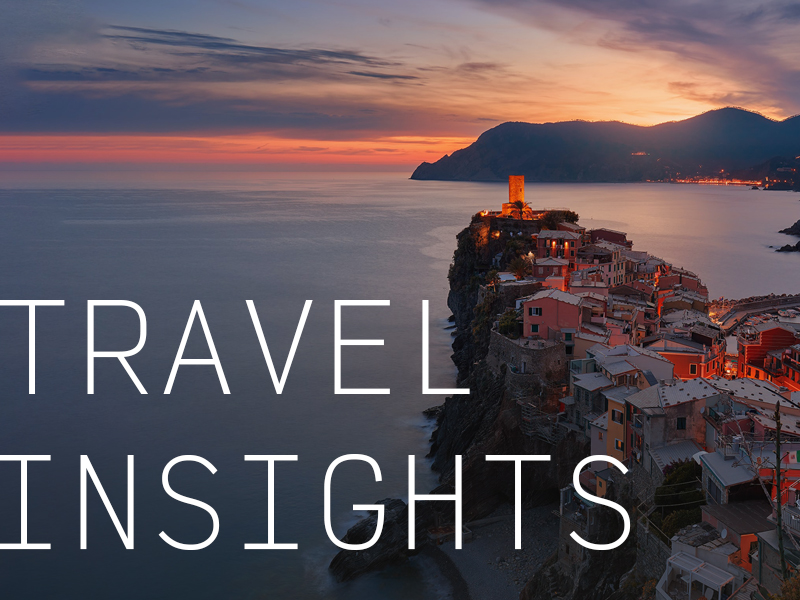Travel Insights: Tailored Travel
Travel & Tourism

As the travel industry continues to expand and evolve, vacation options have become more plentiful with the ability to find options tailored to seemingly endless interest groups, lifestyles and needs. From themed trips appealing to mega fans, to accessible or pet-friendly offerings and even environmental and personal wellness crafted trips, the travel industry offers a wealth of ways to appeal to niche travel audiences.
1. Themed Trips. For mega fans of various forms of entertainment, the travel industry has infused niche interests into vacations and made seeking the right opportunity seamless.
- Airbnb’s new feature, Airbnb Categories, allows travelers to search by particular themes such as surfing, windmills, historic, wineries, and many others. – Airbnb
- Pandemic TV viewing is inspiring themed travels as the world re-opens.
- Travelers are arriving in Wyoming for a chance to cosplay as John Dutton from the hit drama “Yellowstone.” – The New York Times
- Uber launched Uber Explore, a new way to browse and book attractions while in a destination, whether it be something as simple as dinner reservations or museum exhibits, concerts and more. – Travel Pulse
Implications: These new product launches by major brands represent a significant shift in travel decision making. We have always known the consumer journey was not linear. Now we have more evidence that the decision to visit a place doesn’t always come first. Travelers are open to the unknown if it can deliver a personalized experience based on their interest. At a minimum, it is time to revisit your organic search and content strategy in order to capture relevant interest-based demand.
2. Pet-Friendly Provisions. For the lifelong animal lovers and pandemic-era pet purchasers, scheduling a vacation no longer requires arranging for pet care back at home. Travel brands are adapting to the needs of this growing audience of pet owners and offering vacations that include the whole family, even those with four legs.
- Nearly one in five households (~23 million Americans) acquired a cat or dog since the beginning of the Covid outbreak. – ASPCA
- A Santa Barbara hotel, El Encanto, offers a gourmet dog menu with seasonal fish for $15/plate, followed by an herbal tea blend at $5/bowl. – Morning Brew
- Kimpton Hotels & Restaurants has announced an exclusive partnership with Wag!, a mobile-first platform connecting pet owners with professional pet caregivers, to offer their guests dog walking services during their stays.- Travel Pulse
Implications: Travelers expect that their pets will be as well cared for and entertained while traveling as they are at home. The Kimpton example is brilliant in its simplicity. Rather than developing new products or services managed at the hotel level, they have partnered with a well-known brand that consumers already trust and have likely used successfully or know someone who has. The partnership is a win for both brands plus meets the needs of travelers and their furry friends.
3. Accessible for All. As inclusivity becomes an imperative in travel, it is critical to also keep in mind people with differing abilities when crafting travel offerings. Making an accessible travel experience for all expands reach and sends a welcoming message.
- 61% of people with disabilities agree with “I am frustrated by brands that treat people like me as an afterthought” compared to 55% of the rest of the population – Kantar U.S. Monitor
- The leading travel booking company for travelers with disabilities, Wheel the World, is breaking barriers in travel by combining technology and crowdsourcing in its Accessibility Mapping System (AMS), which travelers can use to find detailed accessibility information about accommodations, destinations and experiences in over 25 countries. – Travel Pulse
- Travegali is an accessible tourism site that offers an extensive selection of 5,000+ accessible hotels across 300+ international destinations so all can travel without limitations despite varying international accessibility standards. – Travegali
- “The World’s First Fully ADA Compliant Boutique Hotel Opens in West Virginia” – Southern Living
Implications: According to the US Travel Association July is Disability Pride Month, an important opportunity to recognize and celebrate those around us with disabilities—both visible and unseen—and to identify how our industry can continue to make travel more accessible to everyone. Earlier this month, the Biden administration introduced a first-ever “bill of rights” aimed at helping ensure people with disabilities have a smoother experience when flying. Set aside some time in the coming weeks to think about how your destination (and destination brand) can be more welcoming and manageable for people with varying abilities.
4. Sustainability Suited. The eco-conscious travel audience is expanding, but often feels torn between their lifestyles and values. Travel offerings that are sustainability-minded appeal to this growing segment and do the planet good.
- More American travelers are exhibiting an environmental consciousness. Now 56% say they usually make an effort to limit their personal impact on the environment when traveling (up from 53% in May). – Destination Analysts
- Hilton recently added a search feature on its website that allows you to filter hotels by those with EV charging stations and Expedia also offers sorting by EV charger availability. – Nerd Wallet
- Aspen Chamber Resort Association (ACRA) relaunched the “Aspen Pledge,” asking locals and residents to commit to stewardship of the environment. With every signature ACRA donates $18.80 (1880 was the year Aspen was incorporated) to a local environmental non-profit. – Aspen Chamber Resort Association
Implications: As the desire to travel sustainably moves beyond such a niche audience, many brands still struggle with meaningful change. But small steps count. Tourism Cares’ Meaningful Travel Map tool is a great resource for both businesses and travelers to improve their sustainability. The tool connects travel professionals to social and environmental impact experiences and opportunities throughout the United States, Mexico, and Canada.
5. Holistic Health. Health-seeking travelers are redefining what wellness travel involves as travel brands expand their definitions and offerings related to holistic wellbeing of mind and body.
- With a prominent number of travelers packing their bags for worldwide adventures, DMOs are embracing and promoting the idea of wellness.
- Visit Costa Rica highlights wellness in its offerings and provides travelers sample itineraries for relaxation-themed trips which include varying activities, such as nature viewing, hikes, yoga, and spas. – Visit Costa Rica
- “The hottest new service at hotels? Sleep.” – The Washington Post
- The Cadogan Hotel in London, Hotel Figueroa in Los Angeles, and The Lotte New York Palace are a few of the many hotels investing more heavily in sleep-themed services, with offerings aimed at helping guests get the most out of their shut-eye. – The Washington Post
- The Rancho Pescadero in Mexico was designed for wellness in a sense of balance rather than restriction. Instead of cutting out booze and focusing on detoxifying diets and boot camp classes, the hotel pairs a 25,000-square-foot “wellness pavilion” with generations-old local traditions and a ‘Hangover Experience’ that includes a dish that Mexicans use as a hangover cure, cochinita pibil. The experience is about building community and “living it up” to improve mental health along with overall wellbeing. – BNN Bloomberg
Implications: The notion of wellness in travel often conjures up imagery of mediation and mindfulness, peace and serenity. It is nice to see Rancho Pescadero acknowledge wellness from the perspective of balance. Realizing that celebrations and living life exuberantly can sometimes be as cathartic as a downward dog.
We encourage you to learn more about the various tailored travel offerings seen across the industry in our visual deck at the link below.
